Referral Assessment Plan: Integrated Resort Development in Singapore
VerifiedAdded on 2023/01/05
|12
|2690
|35
Project
AI Summary
This project is a dissertation focused on the development of Integrated Resorts (IR) in Singapore, examining the economic, social, and environmental factors involved. The research aims to review value creation opportunities for IR development, considering stakeholder interests and comparing Singapore's context to other Southeast Asian examples. The methodology includes a descriptive research design with primary data collected through surveys of local residents. The findings suggest that IRs contribute to job creation, enhance leisure options, and boost the entertainment sector. The study concludes with recommendations for the Singapore government, including policy preparation, further IR construction, and job opportunity creation, to enhance tourism and economic growth. The research draws on a wide range of academic sources to support its analysis and recommendations.
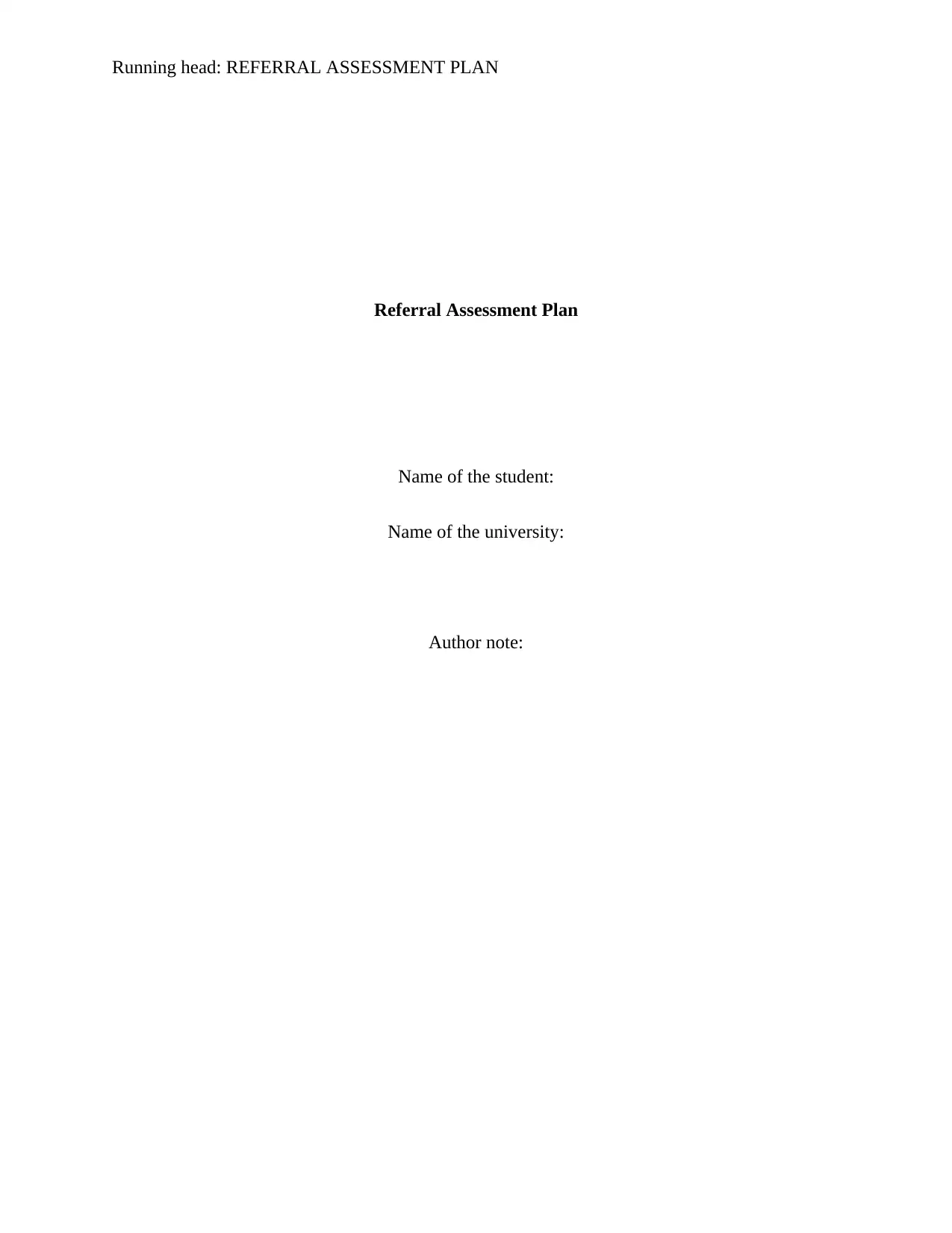
Running head: REFERRAL ASSESSMENT PLAN
Referral Assessment Plan
Name of the student:
Name of the university:
Author note:
Referral Assessment Plan
Name of the student:
Name of the university:
Author note:
Paraphrase This Document
Need a fresh take? Get an instant paraphrase of this document with our AI Paraphraser
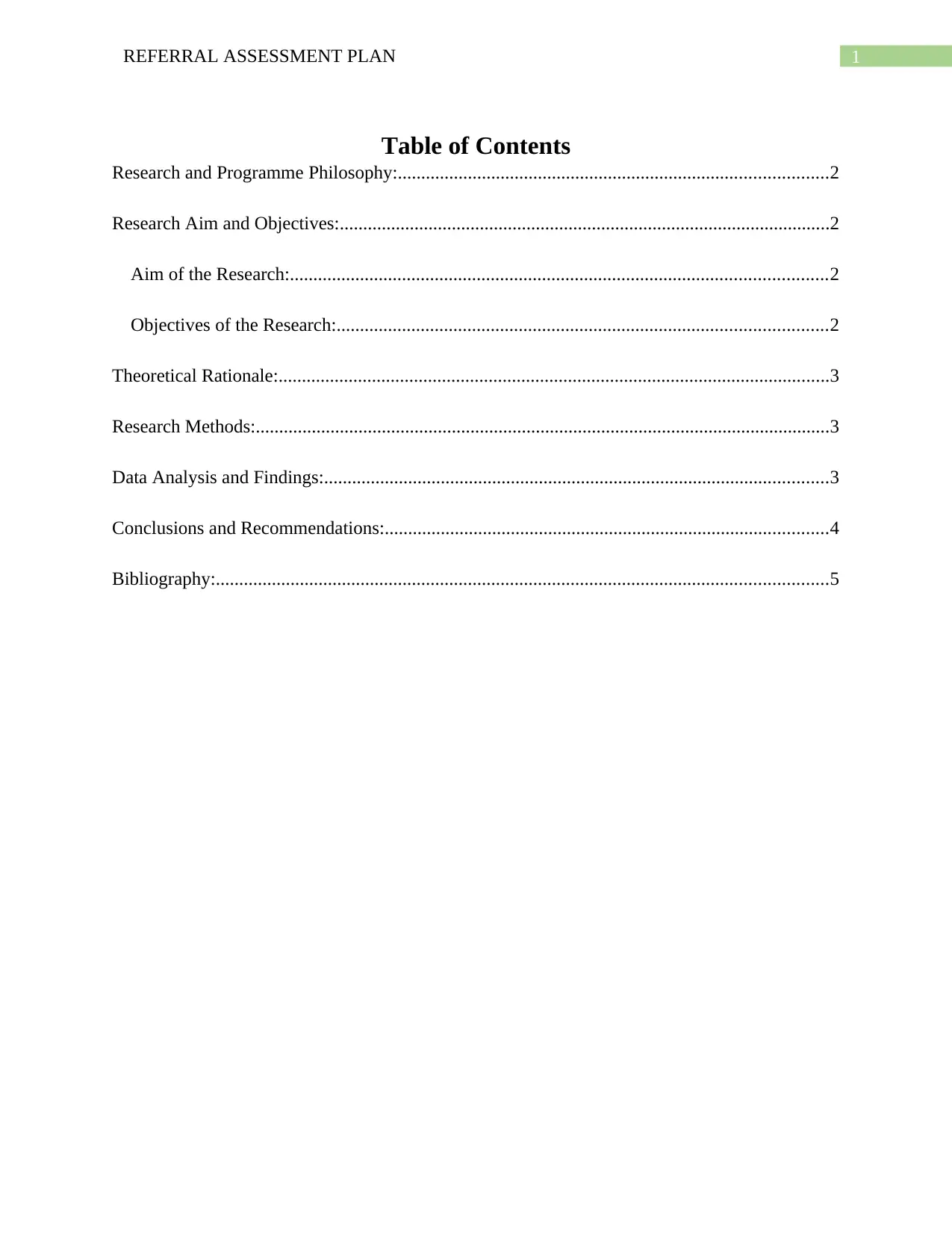
1REFERRAL ASSESSMENT PLAN
Table of Contents
Research and Programme Philosophy:............................................................................................2
Research Aim and Objectives:.........................................................................................................2
Aim of the Research:...................................................................................................................2
Objectives of the Research:.........................................................................................................2
Theoretical Rationale:......................................................................................................................3
Research Methods:...........................................................................................................................3
Data Analysis and Findings:............................................................................................................3
Conclusions and Recommendations:...............................................................................................4
Bibliography:...................................................................................................................................5
Table of Contents
Research and Programme Philosophy:............................................................................................2
Research Aim and Objectives:.........................................................................................................2
Aim of the Research:...................................................................................................................2
Objectives of the Research:.........................................................................................................2
Theoretical Rationale:......................................................................................................................3
Research Methods:...........................................................................................................................3
Data Analysis and Findings:............................................................................................................3
Conclusions and Recommendations:...............................................................................................4
Bibliography:...................................................................................................................................5
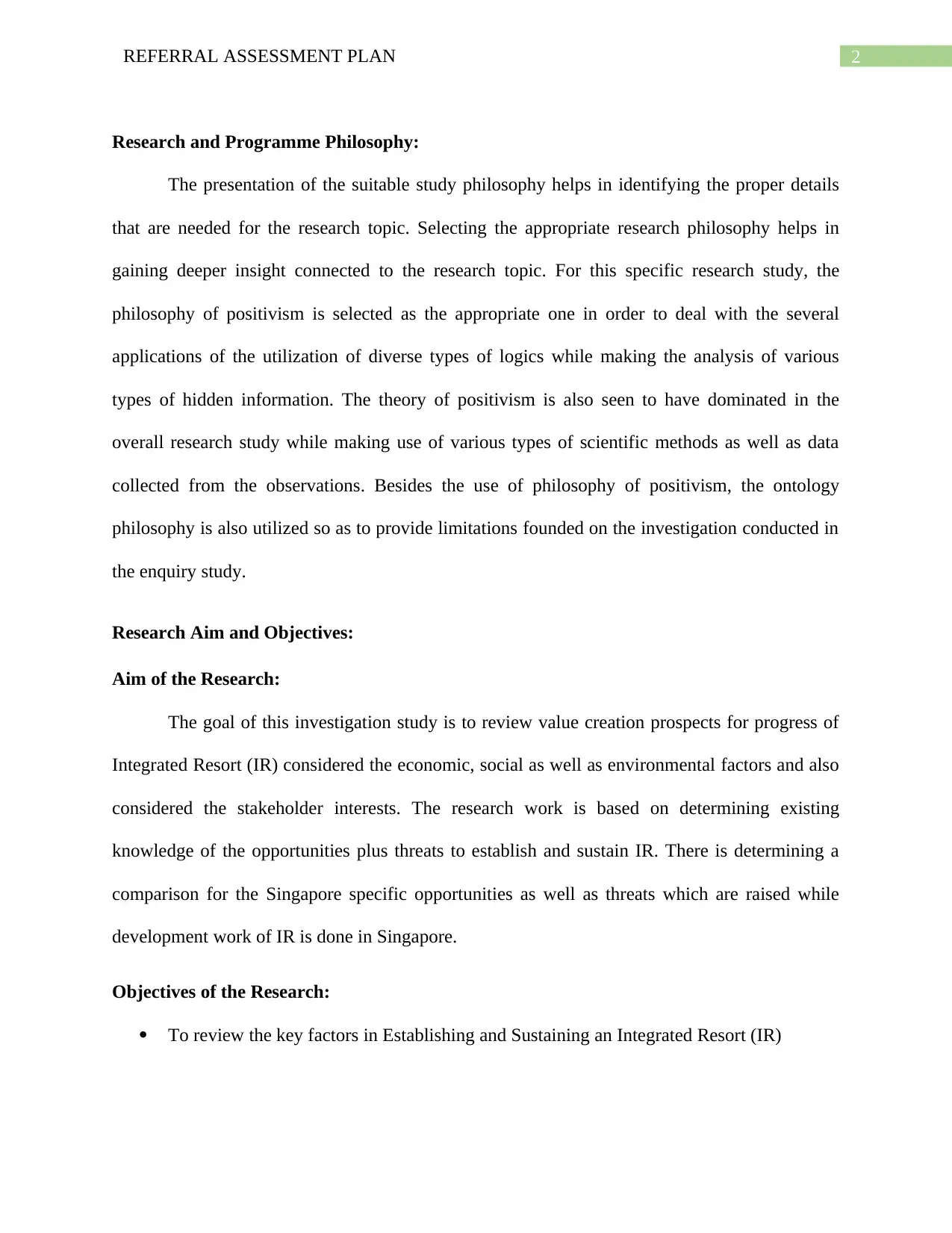
2REFERRAL ASSESSMENT PLAN
Research and Programme Philosophy:
The presentation of the suitable study philosophy helps in identifying the proper details
that are needed for the research topic. Selecting the appropriate research philosophy helps in
gaining deeper insight connected to the research topic. For this specific research study, the
philosophy of positivism is selected as the appropriate one in order to deal with the several
applications of the utilization of diverse types of logics while making the analysis of various
types of hidden information. The theory of positivism is also seen to have dominated in the
overall research study while making use of various types of scientific methods as well as data
collected from the observations. Besides the use of philosophy of positivism, the ontology
philosophy is also utilized so as to provide limitations founded on the investigation conducted in
the enquiry study.
Research Aim and Objectives:
Aim of the Research:
The goal of this investigation study is to review value creation prospects for progress of
Integrated Resort (IR) considered the economic, social as well as environmental factors and also
considered the stakeholder interests. The research work is based on determining existing
knowledge of the opportunities plus threats to establish and sustain IR. There is determining a
comparison for the Singapore specific opportunities as well as threats which are raised while
development work of IR is done in Singapore.
Objectives of the Research:
To review the key factors in Establishing and Sustaining an Integrated Resort (IR)
Research and Programme Philosophy:
The presentation of the suitable study philosophy helps in identifying the proper details
that are needed for the research topic. Selecting the appropriate research philosophy helps in
gaining deeper insight connected to the research topic. For this specific research study, the
philosophy of positivism is selected as the appropriate one in order to deal with the several
applications of the utilization of diverse types of logics while making the analysis of various
types of hidden information. The theory of positivism is also seen to have dominated in the
overall research study while making use of various types of scientific methods as well as data
collected from the observations. Besides the use of philosophy of positivism, the ontology
philosophy is also utilized so as to provide limitations founded on the investigation conducted in
the enquiry study.
Research Aim and Objectives:
Aim of the Research:
The goal of this investigation study is to review value creation prospects for progress of
Integrated Resort (IR) considered the economic, social as well as environmental factors and also
considered the stakeholder interests. The research work is based on determining existing
knowledge of the opportunities plus threats to establish and sustain IR. There is determining a
comparison for the Singapore specific opportunities as well as threats which are raised while
development work of IR is done in Singapore.
Objectives of the Research:
To review the key factors in Establishing and Sustaining an Integrated Resort (IR)
⊘ This is a preview!⊘
Do you want full access?
Subscribe today to unlock all pages.

Trusted by 1+ million students worldwide
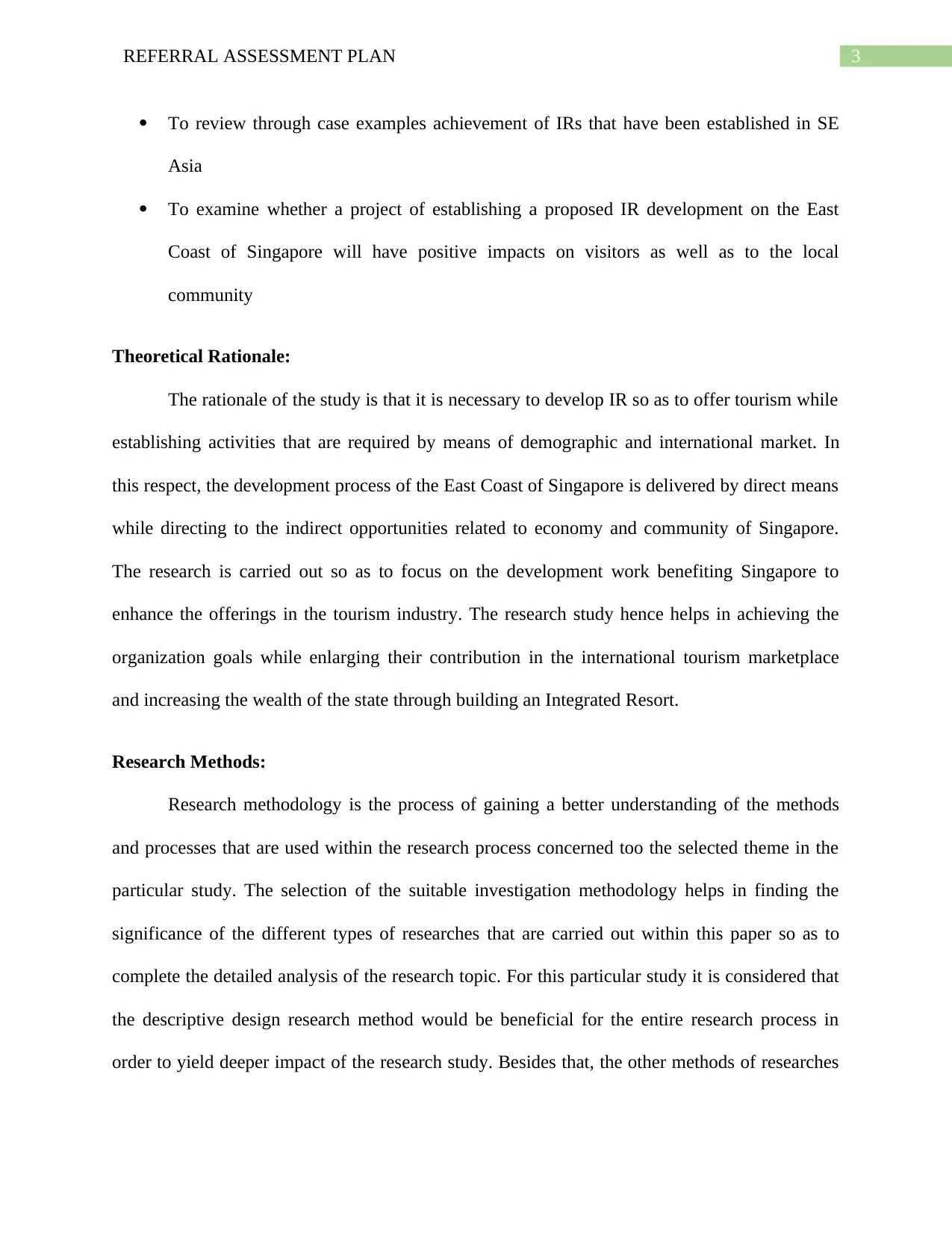
3REFERRAL ASSESSMENT PLAN
To review through case examples achievement of IRs that have been established in SE
Asia
To examine whether a project of establishing a proposed IR development on the East
Coast of Singapore will have positive impacts on visitors as well as to the local
community
Theoretical Rationale:
The rationale of the study is that it is necessary to develop IR so as to offer tourism while
establishing activities that are required by means of demographic and international market. In
this respect, the development process of the East Coast of Singapore is delivered by direct means
while directing to the indirect opportunities related to economy and community of Singapore.
The research is carried out so as to focus on the development work benefiting Singapore to
enhance the offerings in the tourism industry. The research study hence helps in achieving the
organization goals while enlarging their contribution in the international tourism marketplace
and increasing the wealth of the state through building an Integrated Resort.
Research Methods:
Research methodology is the process of gaining a better understanding of the methods
and processes that are used within the research process concerned too the selected theme in the
particular study. The selection of the suitable investigation methodology helps in finding the
significance of the different types of researches that are carried out within this paper so as to
complete the detailed analysis of the research topic. For this particular study it is considered that
the descriptive design research method would be beneficial for the entire research process in
order to yield deeper impact of the research study. Besides that, the other methods of researches
To review through case examples achievement of IRs that have been established in SE
Asia
To examine whether a project of establishing a proposed IR development on the East
Coast of Singapore will have positive impacts on visitors as well as to the local
community
Theoretical Rationale:
The rationale of the study is that it is necessary to develop IR so as to offer tourism while
establishing activities that are required by means of demographic and international market. In
this respect, the development process of the East Coast of Singapore is delivered by direct means
while directing to the indirect opportunities related to economy and community of Singapore.
The research is carried out so as to focus on the development work benefiting Singapore to
enhance the offerings in the tourism industry. The research study hence helps in achieving the
organization goals while enlarging their contribution in the international tourism marketplace
and increasing the wealth of the state through building an Integrated Resort.
Research Methods:
Research methodology is the process of gaining a better understanding of the methods
and processes that are used within the research process concerned too the selected theme in the
particular study. The selection of the suitable investigation methodology helps in finding the
significance of the different types of researches that are carried out within this paper so as to
complete the detailed analysis of the research topic. For this particular study it is considered that
the descriptive design research method would be beneficial for the entire research process in
order to yield deeper impact of the research study. Besides that, the other methods of researches
Paraphrase This Document
Need a fresh take? Get an instant paraphrase of this document with our AI Paraphraser
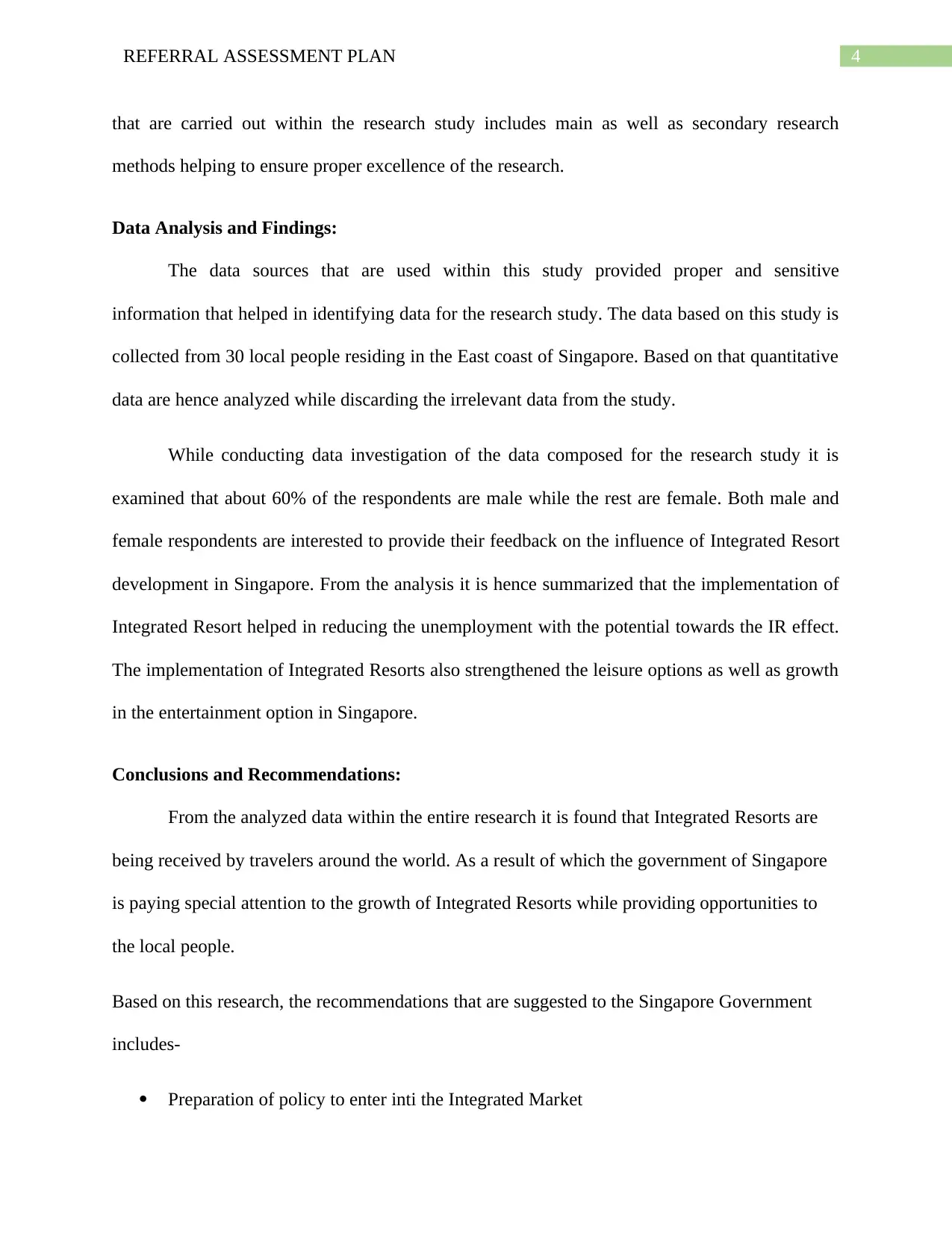
4REFERRAL ASSESSMENT PLAN
that are carried out within the research study includes main as well as secondary research
methods helping to ensure proper excellence of the research.
Data Analysis and Findings:
The data sources that are used within this study provided proper and sensitive
information that helped in identifying data for the research study. The data based on this study is
collected from 30 local people residing in the East coast of Singapore. Based on that quantitative
data are hence analyzed while discarding the irrelevant data from the study.
While conducting data investigation of the data composed for the research study it is
examined that about 60% of the respondents are male while the rest are female. Both male and
female respondents are interested to provide their feedback on the influence of Integrated Resort
development in Singapore. From the analysis it is hence summarized that the implementation of
Integrated Resort helped in reducing the unemployment with the potential towards the IR effect.
The implementation of Integrated Resorts also strengthened the leisure options as well as growth
in the entertainment option in Singapore.
Conclusions and Recommendations:
From the analyzed data within the entire research it is found that Integrated Resorts are
being received by travelers around the world. As a result of which the government of Singapore
is paying special attention to the growth of Integrated Resorts while providing opportunities to
the local people.
Based on this research, the recommendations that are suggested to the Singapore Government
includes-
Preparation of policy to enter inti the Integrated Market
that are carried out within the research study includes main as well as secondary research
methods helping to ensure proper excellence of the research.
Data Analysis and Findings:
The data sources that are used within this study provided proper and sensitive
information that helped in identifying data for the research study. The data based on this study is
collected from 30 local people residing in the East coast of Singapore. Based on that quantitative
data are hence analyzed while discarding the irrelevant data from the study.
While conducting data investigation of the data composed for the research study it is
examined that about 60% of the respondents are male while the rest are female. Both male and
female respondents are interested to provide their feedback on the influence of Integrated Resort
development in Singapore. From the analysis it is hence summarized that the implementation of
Integrated Resort helped in reducing the unemployment with the potential towards the IR effect.
The implementation of Integrated Resorts also strengthened the leisure options as well as growth
in the entertainment option in Singapore.
Conclusions and Recommendations:
From the analyzed data within the entire research it is found that Integrated Resorts are
being received by travelers around the world. As a result of which the government of Singapore
is paying special attention to the growth of Integrated Resorts while providing opportunities to
the local people.
Based on this research, the recommendations that are suggested to the Singapore Government
includes-
Preparation of policy to enter inti the Integrated Market

5REFERRAL ASSESSMENT PLAN
To construct more number of IR to enhance greater flow of economics in the business
organizations.
To provide diverse opportunities of job with the implementation of IR .
To construct more number of IR to enhance greater flow of economics in the business
organizations.
To provide diverse opportunities of job with the implementation of IR .
⊘ This is a preview!⊘
Do you want full access?
Subscribe today to unlock all pages.

Trusted by 1+ million students worldwide
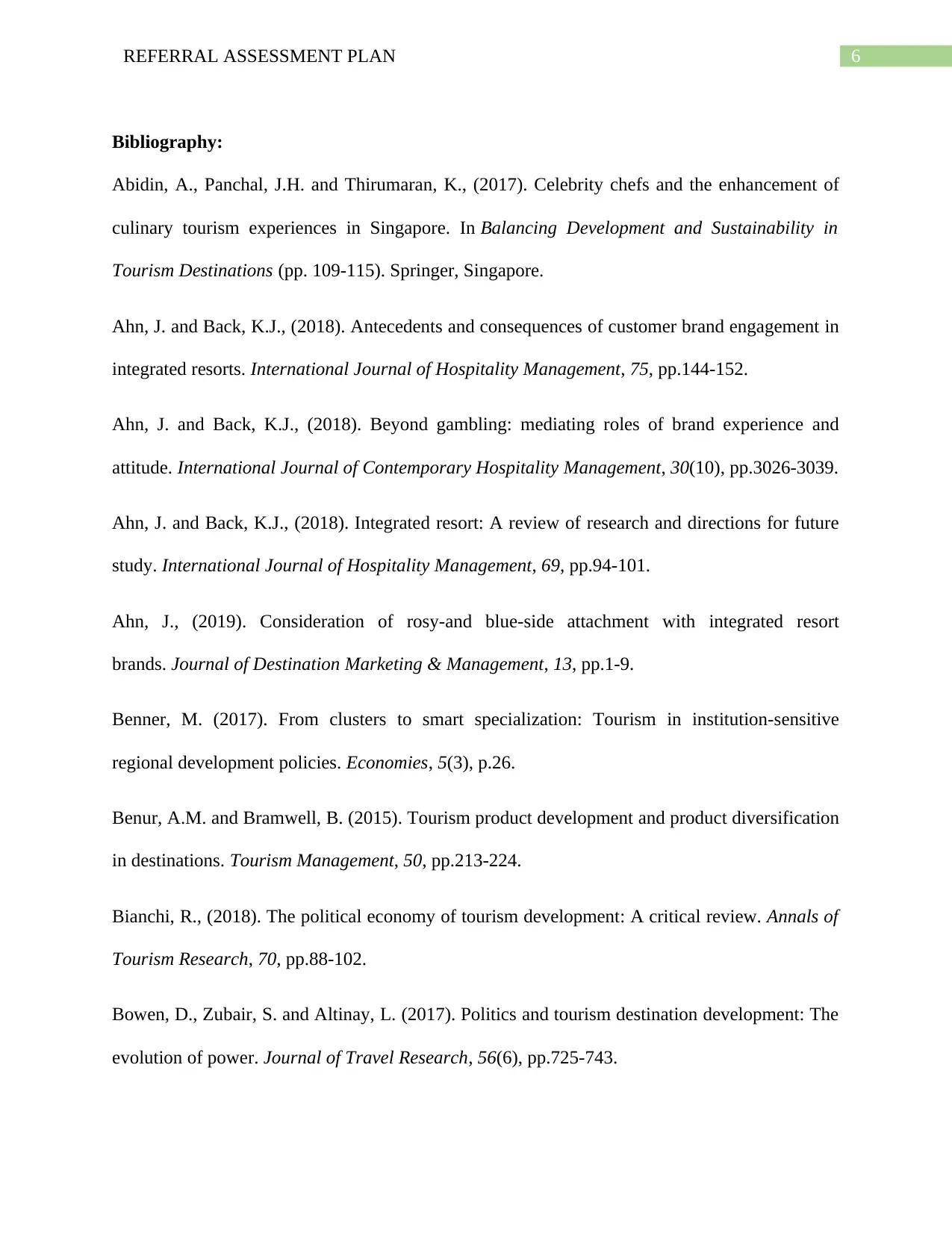
6REFERRAL ASSESSMENT PLAN
Bibliography:
Abidin, A., Panchal, J.H. and Thirumaran, K., (2017). Celebrity chefs and the enhancement of
culinary tourism experiences in Singapore. In Balancing Development and Sustainability in
Tourism Destinations (pp. 109-115). Springer, Singapore.
Ahn, J. and Back, K.J., (2018). Antecedents and consequences of customer brand engagement in
integrated resorts. International Journal of Hospitality Management, 75, pp.144-152.
Ahn, J. and Back, K.J., (2018). Beyond gambling: mediating roles of brand experience and
attitude. International Journal of Contemporary Hospitality Management, 30(10), pp.3026-3039.
Ahn, J. and Back, K.J., (2018). Integrated resort: A review of research and directions for future
study. International Journal of Hospitality Management, 69, pp.94-101.
Ahn, J., (2019). Consideration of rosy-and blue-side attachment with integrated resort
brands. Journal of Destination Marketing & Management, 13, pp.1-9.
Benner, M. (2017). From clusters to smart specialization: Tourism in institution-sensitive
regional development policies. Economies, 5(3), p.26.
Benur, A.M. and Bramwell, B. (2015). Tourism product development and product diversification
in destinations. Tourism Management, 50, pp.213-224.
Bianchi, R., (2018). The political economy of tourism development: A critical review. Annals of
Tourism Research, 70, pp.88-102.
Bowen, D., Zubair, S. and Altinay, L. (2017). Politics and tourism destination development: The
evolution of power. Journal of Travel Research, 56(6), pp.725-743.
Bibliography:
Abidin, A., Panchal, J.H. and Thirumaran, K., (2017). Celebrity chefs and the enhancement of
culinary tourism experiences in Singapore. In Balancing Development and Sustainability in
Tourism Destinations (pp. 109-115). Springer, Singapore.
Ahn, J. and Back, K.J., (2018). Antecedents and consequences of customer brand engagement in
integrated resorts. International Journal of Hospitality Management, 75, pp.144-152.
Ahn, J. and Back, K.J., (2018). Beyond gambling: mediating roles of brand experience and
attitude. International Journal of Contemporary Hospitality Management, 30(10), pp.3026-3039.
Ahn, J. and Back, K.J., (2018). Integrated resort: A review of research and directions for future
study. International Journal of Hospitality Management, 69, pp.94-101.
Ahn, J., (2019). Consideration of rosy-and blue-side attachment with integrated resort
brands. Journal of Destination Marketing & Management, 13, pp.1-9.
Benner, M. (2017). From clusters to smart specialization: Tourism in institution-sensitive
regional development policies. Economies, 5(3), p.26.
Benur, A.M. and Bramwell, B. (2015). Tourism product development and product diversification
in destinations. Tourism Management, 50, pp.213-224.
Bianchi, R., (2018). The political economy of tourism development: A critical review. Annals of
Tourism Research, 70, pp.88-102.
Bowen, D., Zubair, S. and Altinay, L. (2017). Politics and tourism destination development: The
evolution of power. Journal of Travel Research, 56(6), pp.725-743.
Paraphrase This Document
Need a fresh take? Get an instant paraphrase of this document with our AI Paraphraser
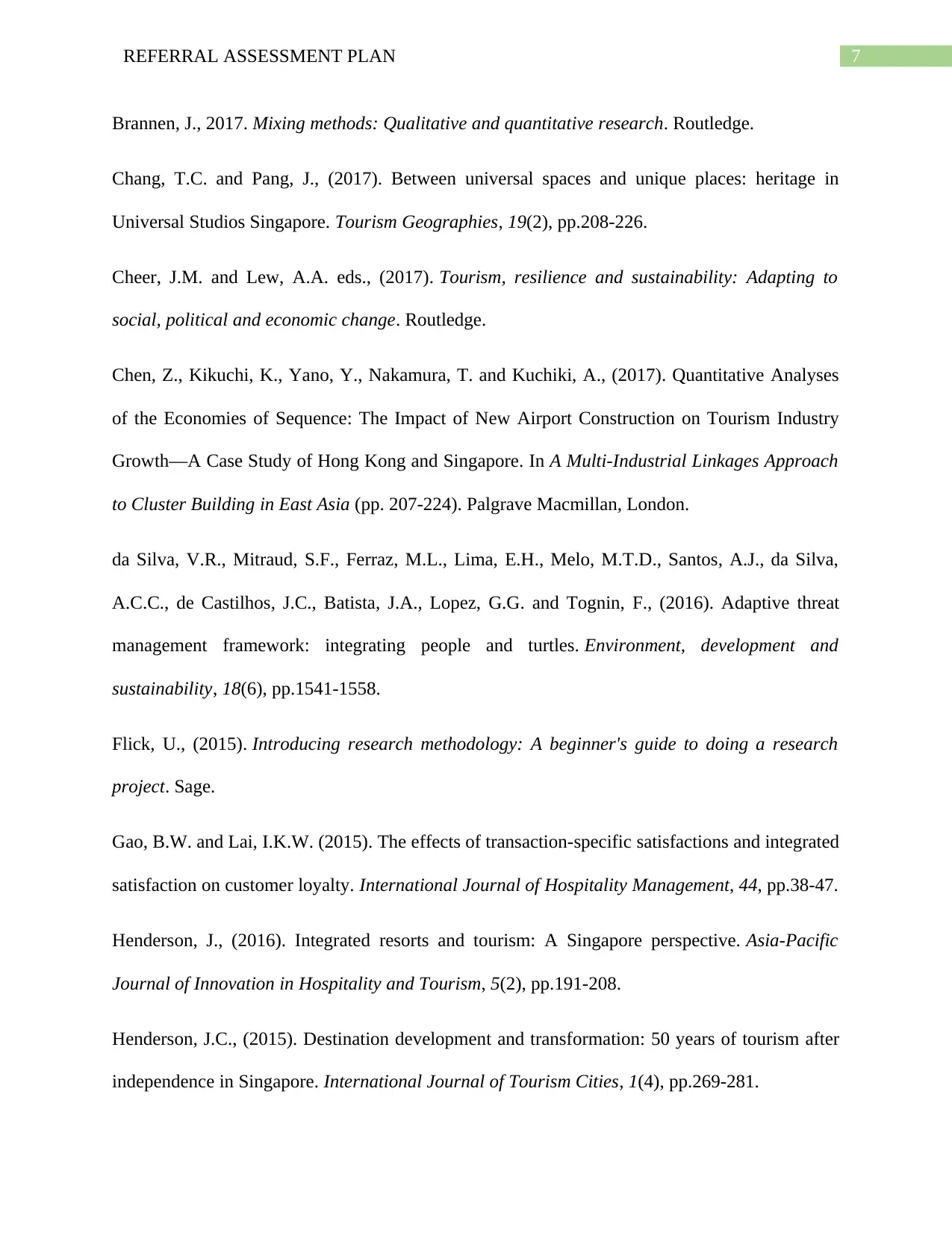
7REFERRAL ASSESSMENT PLAN
Brannen, J., 2017. Mixing methods: Qualitative and quantitative research. Routledge.
Chang, T.C. and Pang, J., (2017). Between universal spaces and unique places: heritage in
Universal Studios Singapore. Tourism Geographies, 19(2), pp.208-226.
Cheer, J.M. and Lew, A.A. eds., (2017). Tourism, resilience and sustainability: Adapting to
social, political and economic change. Routledge.
Chen, Z., Kikuchi, K., Yano, Y., Nakamura, T. and Kuchiki, A., (2017). Quantitative Analyses
of the Economies of Sequence: The Impact of New Airport Construction on Tourism Industry
Growth—A Case Study of Hong Kong and Singapore. In A Multi-Industrial Linkages Approach
to Cluster Building in East Asia (pp. 207-224). Palgrave Macmillan, London.
da Silva, V.R., Mitraud, S.F., Ferraz, M.L., Lima, E.H., Melo, M.T.D., Santos, A.J., da Silva,
A.C.C., de Castilhos, J.C., Batista, J.A., Lopez, G.G. and Tognin, F., (2016). Adaptive threat
management framework: integrating people and turtles. Environment, development and
sustainability, 18(6), pp.1541-1558.
Flick, U., (2015). Introducing research methodology: A beginner's guide to doing a research
project. Sage.
Gao, B.W. and Lai, I.K.W. (2015). The effects of transaction-specific satisfactions and integrated
satisfaction on customer loyalty. International Journal of Hospitality Management, 44, pp.38-47.
Henderson, J., (2016). Integrated resorts and tourism: A Singapore perspective. Asia-Pacific
Journal of Innovation in Hospitality and Tourism, 5(2), pp.191-208.
Henderson, J.C., (2015). Destination development and transformation: 50 years of tourism after
independence in Singapore. International Journal of Tourism Cities, 1(4), pp.269-281.
Brannen, J., 2017. Mixing methods: Qualitative and quantitative research. Routledge.
Chang, T.C. and Pang, J., (2017). Between universal spaces and unique places: heritage in
Universal Studios Singapore. Tourism Geographies, 19(2), pp.208-226.
Cheer, J.M. and Lew, A.A. eds., (2017). Tourism, resilience and sustainability: Adapting to
social, political and economic change. Routledge.
Chen, Z., Kikuchi, K., Yano, Y., Nakamura, T. and Kuchiki, A., (2017). Quantitative Analyses
of the Economies of Sequence: The Impact of New Airport Construction on Tourism Industry
Growth—A Case Study of Hong Kong and Singapore. In A Multi-Industrial Linkages Approach
to Cluster Building in East Asia (pp. 207-224). Palgrave Macmillan, London.
da Silva, V.R., Mitraud, S.F., Ferraz, M.L., Lima, E.H., Melo, M.T.D., Santos, A.J., da Silva,
A.C.C., de Castilhos, J.C., Batista, J.A., Lopez, G.G. and Tognin, F., (2016). Adaptive threat
management framework: integrating people and turtles. Environment, development and
sustainability, 18(6), pp.1541-1558.
Flick, U., (2015). Introducing research methodology: A beginner's guide to doing a research
project. Sage.
Gao, B.W. and Lai, I.K.W. (2015). The effects of transaction-specific satisfactions and integrated
satisfaction on customer loyalty. International Journal of Hospitality Management, 44, pp.38-47.
Henderson, J., (2016). Integrated resorts and tourism: A Singapore perspective. Asia-Pacific
Journal of Innovation in Hospitality and Tourism, 5(2), pp.191-208.
Henderson, J.C., (2015). Destination development and transformation: 50 years of tourism after
independence in Singapore. International Journal of Tourism Cities, 1(4), pp.269-281.
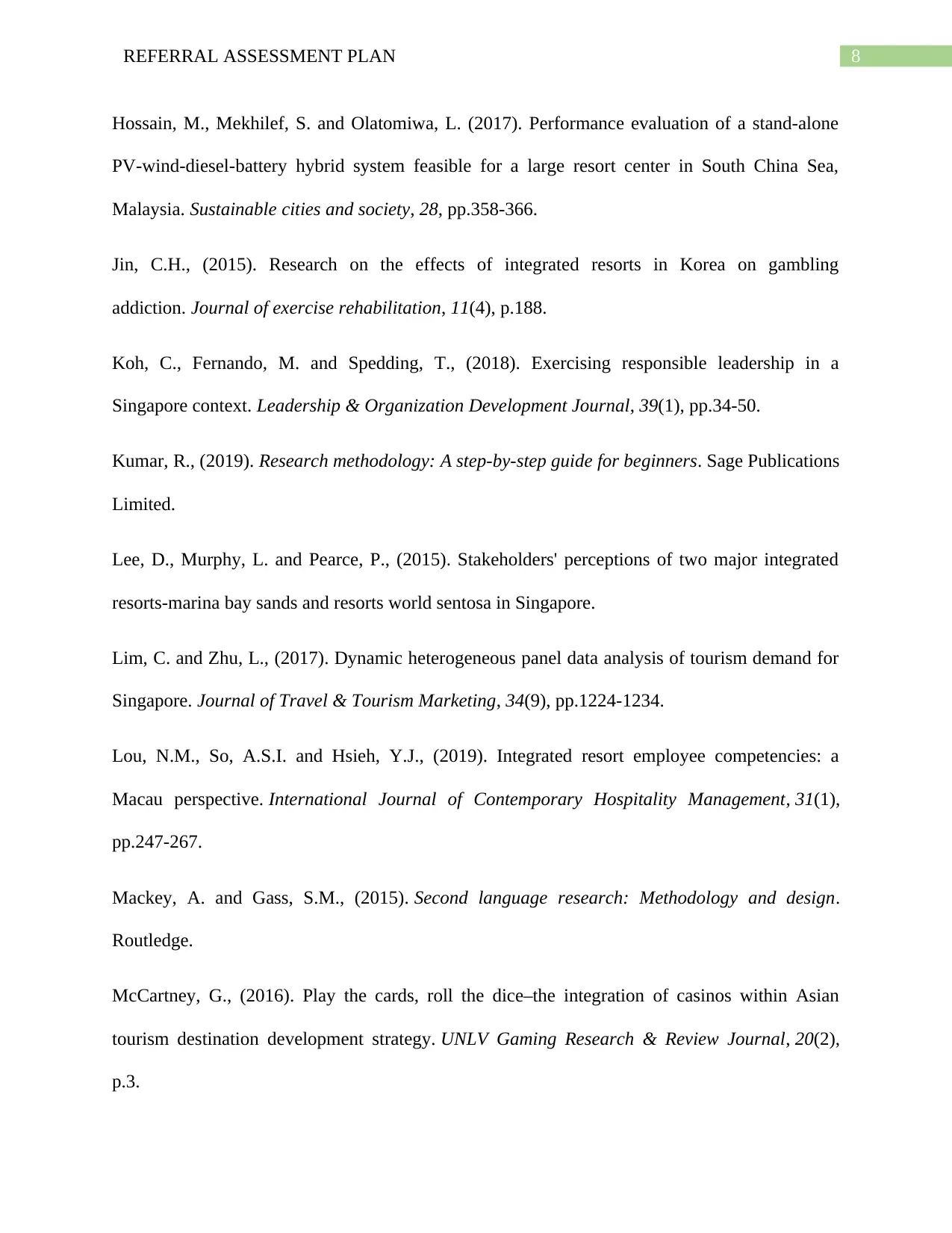
8REFERRAL ASSESSMENT PLAN
Hossain, M., Mekhilef, S. and Olatomiwa, L. (2017). Performance evaluation of a stand-alone
PV-wind-diesel-battery hybrid system feasible for a large resort center in South China Sea,
Malaysia. Sustainable cities and society, 28, pp.358-366.
Jin, C.H., (2015). Research on the effects of integrated resorts in Korea on gambling
addiction. Journal of exercise rehabilitation, 11(4), p.188.
Koh, C., Fernando, M. and Spedding, T., (2018). Exercising responsible leadership in a
Singapore context. Leadership & Organization Development Journal, 39(1), pp.34-50.
Kumar, R., (2019). Research methodology: A step-by-step guide for beginners. Sage Publications
Limited.
Lee, D., Murphy, L. and Pearce, P., (2015). Stakeholders' perceptions of two major integrated
resorts-marina bay sands and resorts world sentosa in Singapore.
Lim, C. and Zhu, L., (2017). Dynamic heterogeneous panel data analysis of tourism demand for
Singapore. Journal of Travel & Tourism Marketing, 34(9), pp.1224-1234.
Lou, N.M., So, A.S.I. and Hsieh, Y.J., (2019). Integrated resort employee competencies: a
Macau perspective. International Journal of Contemporary Hospitality Management, 31(1),
pp.247-267.
Mackey, A. and Gass, S.M., (2015). Second language research: Methodology and design.
Routledge.
McCartney, G., (2016). Play the cards, roll the dice–the integration of casinos within Asian
tourism destination development strategy. UNLV Gaming Research & Review Journal, 20(2),
p.3.
Hossain, M., Mekhilef, S. and Olatomiwa, L. (2017). Performance evaluation of a stand-alone
PV-wind-diesel-battery hybrid system feasible for a large resort center in South China Sea,
Malaysia. Sustainable cities and society, 28, pp.358-366.
Jin, C.H., (2015). Research on the effects of integrated resorts in Korea on gambling
addiction. Journal of exercise rehabilitation, 11(4), p.188.
Koh, C., Fernando, M. and Spedding, T., (2018). Exercising responsible leadership in a
Singapore context. Leadership & Organization Development Journal, 39(1), pp.34-50.
Kumar, R., (2019). Research methodology: A step-by-step guide for beginners. Sage Publications
Limited.
Lee, D., Murphy, L. and Pearce, P., (2015). Stakeholders' perceptions of two major integrated
resorts-marina bay sands and resorts world sentosa in Singapore.
Lim, C. and Zhu, L., (2017). Dynamic heterogeneous panel data analysis of tourism demand for
Singapore. Journal of Travel & Tourism Marketing, 34(9), pp.1224-1234.
Lou, N.M., So, A.S.I. and Hsieh, Y.J., (2019). Integrated resort employee competencies: a
Macau perspective. International Journal of Contemporary Hospitality Management, 31(1),
pp.247-267.
Mackey, A. and Gass, S.M., (2015). Second language research: Methodology and design.
Routledge.
McCartney, G., (2016). Play the cards, roll the dice–the integration of casinos within Asian
tourism destination development strategy. UNLV Gaming Research & Review Journal, 20(2),
p.3.
⊘ This is a preview!⊘
Do you want full access?
Subscribe today to unlock all pages.

Trusted by 1+ million students worldwide
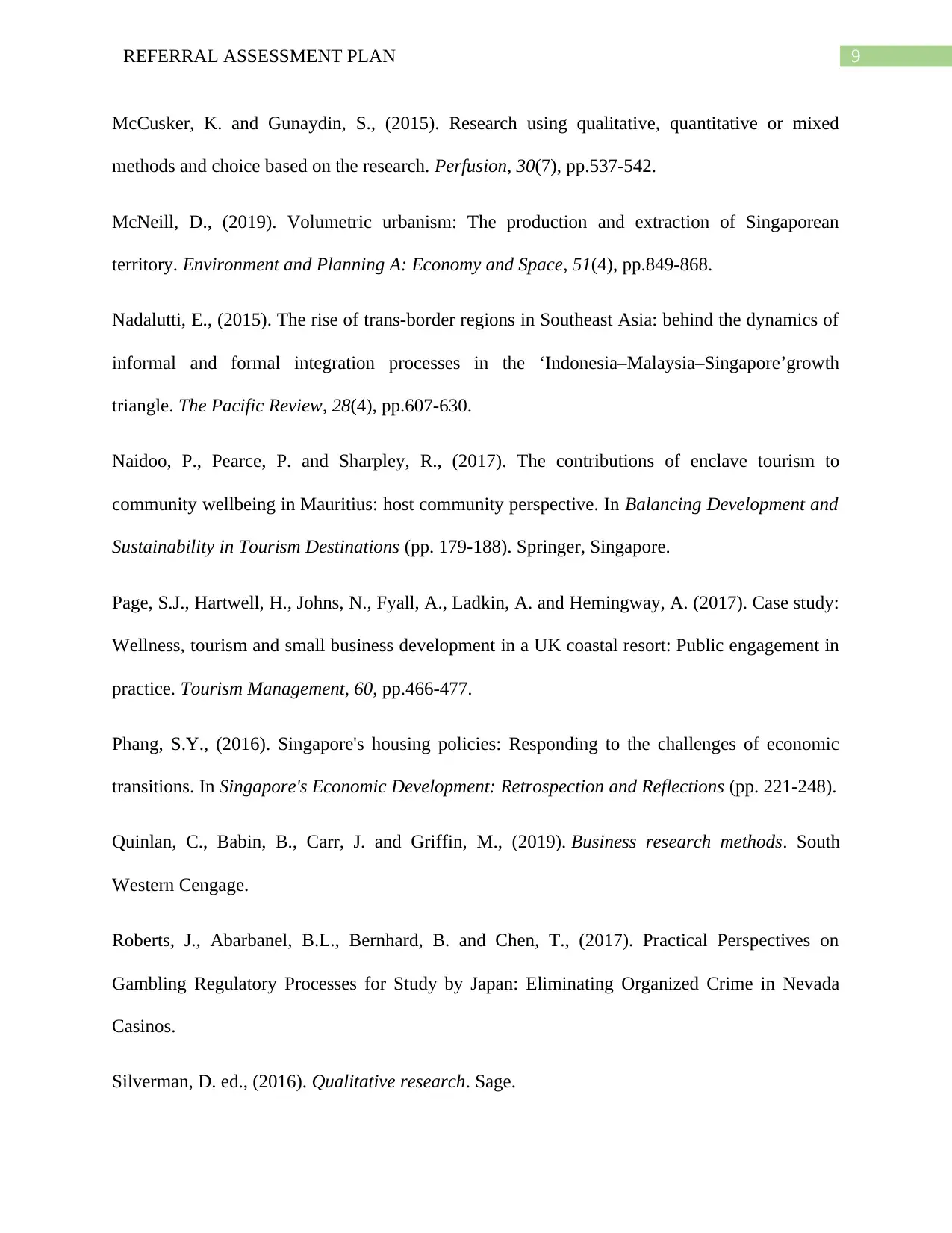
9REFERRAL ASSESSMENT PLAN
McCusker, K. and Gunaydin, S., (2015). Research using qualitative, quantitative or mixed
methods and choice based on the research. Perfusion, 30(7), pp.537-542.
McNeill, D., (2019). Volumetric urbanism: The production and extraction of Singaporean
territory. Environment and Planning A: Economy and Space, 51(4), pp.849-868.
Nadalutti, E., (2015). The rise of trans-border regions in Southeast Asia: behind the dynamics of
informal and formal integration processes in the ‘Indonesia–Malaysia–Singapore’growth
triangle. The Pacific Review, 28(4), pp.607-630.
Naidoo, P., Pearce, P. and Sharpley, R., (2017). The contributions of enclave tourism to
community wellbeing in Mauritius: host community perspective. In Balancing Development and
Sustainability in Tourism Destinations (pp. 179-188). Springer, Singapore.
Page, S.J., Hartwell, H., Johns, N., Fyall, A., Ladkin, A. and Hemingway, A. (2017). Case study:
Wellness, tourism and small business development in a UK coastal resort: Public engagement in
practice. Tourism Management, 60, pp.466-477.
Phang, S.Y., (2016). Singapore's housing policies: Responding to the challenges of economic
transitions. In Singapore's Economic Development: Retrospection and Reflections (pp. 221-248).
Quinlan, C., Babin, B., Carr, J. and Griffin, M., (2019). Business research methods. South
Western Cengage.
Roberts, J., Abarbanel, B.L., Bernhard, B. and Chen, T., (2017). Practical Perspectives on
Gambling Regulatory Processes for Study by Japan: Eliminating Organized Crime in Nevada
Casinos.
Silverman, D. ed., (2016). Qualitative research. Sage.
McCusker, K. and Gunaydin, S., (2015). Research using qualitative, quantitative or mixed
methods and choice based on the research. Perfusion, 30(7), pp.537-542.
McNeill, D., (2019). Volumetric urbanism: The production and extraction of Singaporean
territory. Environment and Planning A: Economy and Space, 51(4), pp.849-868.
Nadalutti, E., (2015). The rise of trans-border regions in Southeast Asia: behind the dynamics of
informal and formal integration processes in the ‘Indonesia–Malaysia–Singapore’growth
triangle. The Pacific Review, 28(4), pp.607-630.
Naidoo, P., Pearce, P. and Sharpley, R., (2017). The contributions of enclave tourism to
community wellbeing in Mauritius: host community perspective. In Balancing Development and
Sustainability in Tourism Destinations (pp. 179-188). Springer, Singapore.
Page, S.J., Hartwell, H., Johns, N., Fyall, A., Ladkin, A. and Hemingway, A. (2017). Case study:
Wellness, tourism and small business development in a UK coastal resort: Public engagement in
practice. Tourism Management, 60, pp.466-477.
Phang, S.Y., (2016). Singapore's housing policies: Responding to the challenges of economic
transitions. In Singapore's Economic Development: Retrospection and Reflections (pp. 221-248).
Quinlan, C., Babin, B., Carr, J. and Griffin, M., (2019). Business research methods. South
Western Cengage.
Roberts, J., Abarbanel, B.L., Bernhard, B. and Chen, T., (2017). Practical Perspectives on
Gambling Regulatory Processes for Study by Japan: Eliminating Organized Crime in Nevada
Casinos.
Silverman, D. ed., (2016). Qualitative research. Sage.
Paraphrase This Document
Need a fresh take? Get an instant paraphrase of this document with our AI Paraphraser
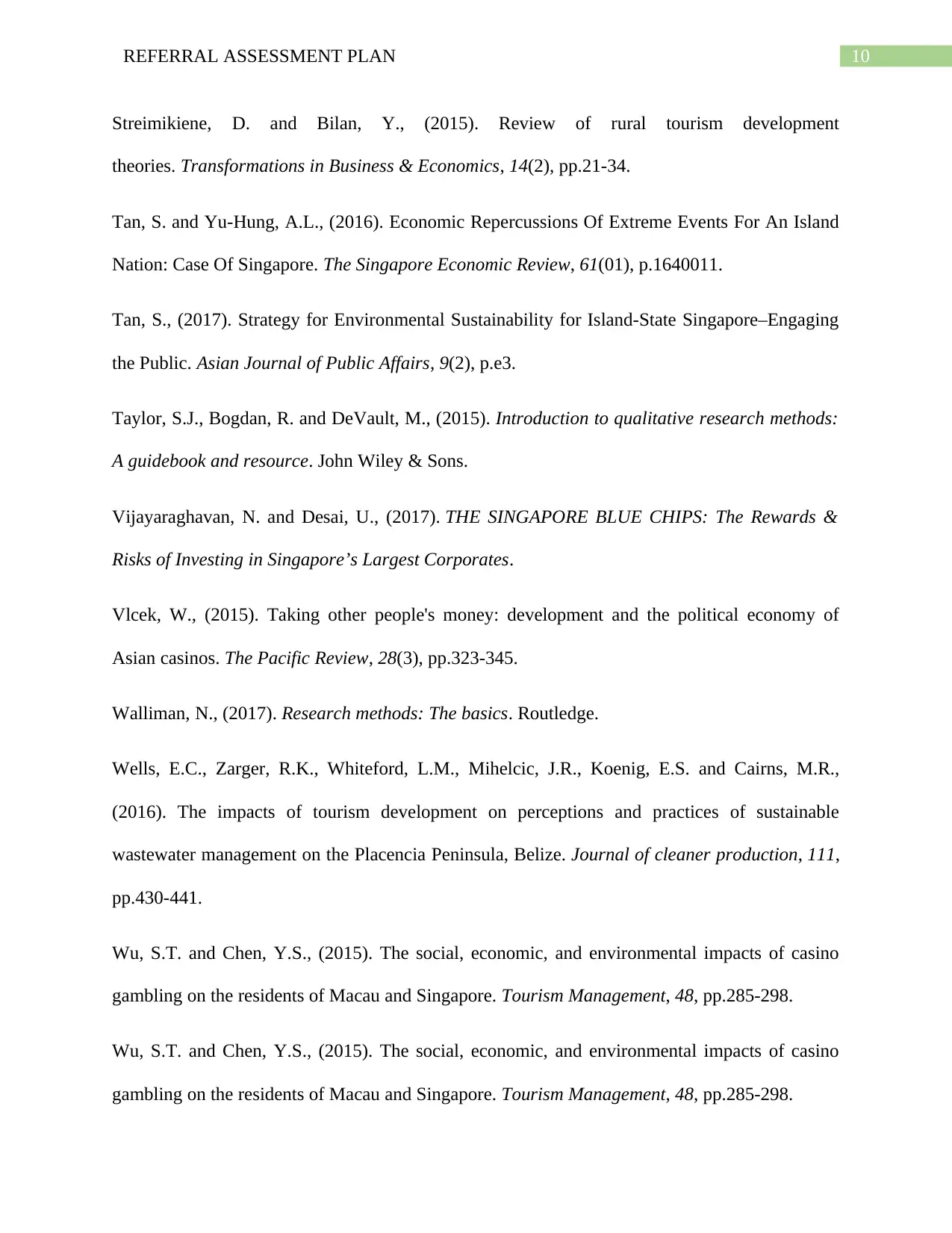
10REFERRAL ASSESSMENT PLAN
Streimikiene, D. and Bilan, Y., (2015). Review of rural tourism development
theories. Transformations in Business & Economics, 14(2), pp.21-34.
Tan, S. and Yu-Hung, A.L., (2016). Economic Repercussions Of Extreme Events For An Island
Nation: Case Of Singapore. The Singapore Economic Review, 61(01), p.1640011.
Tan, S., (2017). Strategy for Environmental Sustainability for Island-State Singapore–Engaging
the Public. Asian Journal of Public Affairs, 9(2), p.e3.
Taylor, S.J., Bogdan, R. and DeVault, M., (2015). Introduction to qualitative research methods:
A guidebook and resource. John Wiley & Sons.
Vijayaraghavan, N. and Desai, U., (2017). THE SINGAPORE BLUE CHIPS: The Rewards &
Risks of Investing in Singapore’s Largest Corporates.
Vlcek, W., (2015). Taking other people's money: development and the political economy of
Asian casinos. The Pacific Review, 28(3), pp.323-345.
Walliman, N., (2017). Research methods: The basics. Routledge.
Wells, E.C., Zarger, R.K., Whiteford, L.M., Mihelcic, J.R., Koenig, E.S. and Cairns, M.R.,
(2016). The impacts of tourism development on perceptions and practices of sustainable
wastewater management on the Placencia Peninsula, Belize. Journal of cleaner production, 111,
pp.430-441.
Wu, S.T. and Chen, Y.S., (2015). The social, economic, and environmental impacts of casino
gambling on the residents of Macau and Singapore. Tourism Management, 48, pp.285-298.
Wu, S.T. and Chen, Y.S., (2015). The social, economic, and environmental impacts of casino
gambling on the residents of Macau and Singapore. Tourism Management, 48, pp.285-298.
Streimikiene, D. and Bilan, Y., (2015). Review of rural tourism development
theories. Transformations in Business & Economics, 14(2), pp.21-34.
Tan, S. and Yu-Hung, A.L., (2016). Economic Repercussions Of Extreme Events For An Island
Nation: Case Of Singapore. The Singapore Economic Review, 61(01), p.1640011.
Tan, S., (2017). Strategy for Environmental Sustainability for Island-State Singapore–Engaging
the Public. Asian Journal of Public Affairs, 9(2), p.e3.
Taylor, S.J., Bogdan, R. and DeVault, M., (2015). Introduction to qualitative research methods:
A guidebook and resource. John Wiley & Sons.
Vijayaraghavan, N. and Desai, U., (2017). THE SINGAPORE BLUE CHIPS: The Rewards &
Risks of Investing in Singapore’s Largest Corporates.
Vlcek, W., (2015). Taking other people's money: development and the political economy of
Asian casinos. The Pacific Review, 28(3), pp.323-345.
Walliman, N., (2017). Research methods: The basics. Routledge.
Wells, E.C., Zarger, R.K., Whiteford, L.M., Mihelcic, J.R., Koenig, E.S. and Cairns, M.R.,
(2016). The impacts of tourism development on perceptions and practices of sustainable
wastewater management on the Placencia Peninsula, Belize. Journal of cleaner production, 111,
pp.430-441.
Wu, S.T. and Chen, Y.S., (2015). The social, economic, and environmental impacts of casino
gambling on the residents of Macau and Singapore. Tourism Management, 48, pp.285-298.
Wu, S.T. and Chen, Y.S., (2015). The social, economic, and environmental impacts of casino
gambling on the residents of Macau and Singapore. Tourism Management, 48, pp.285-298.
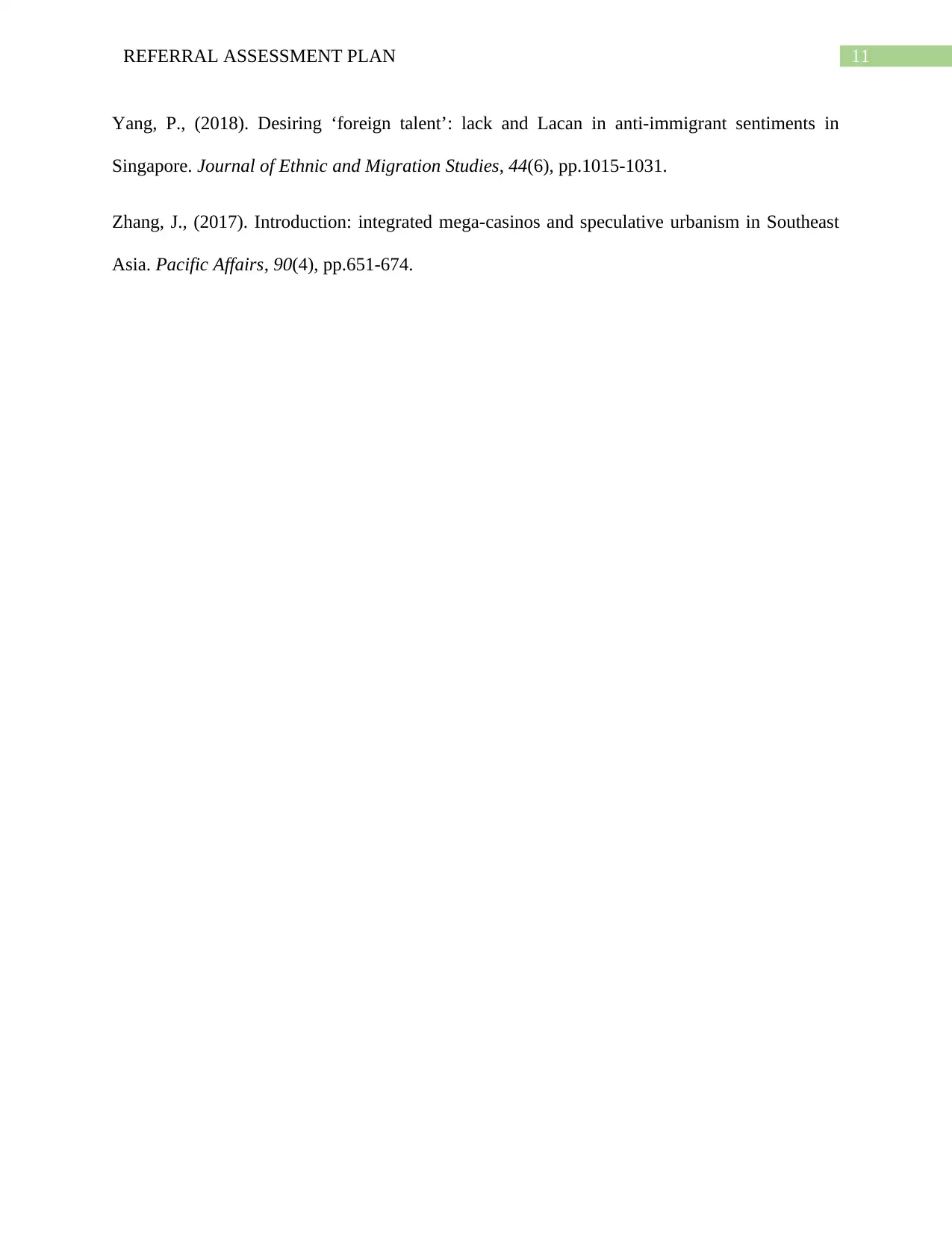
11REFERRAL ASSESSMENT PLAN
Yang, P., (2018). Desiring ‘foreign talent’: lack and Lacan in anti-immigrant sentiments in
Singapore. Journal of Ethnic and Migration Studies, 44(6), pp.1015-1031.
Zhang, J., (2017). Introduction: integrated mega-casinos and speculative urbanism in Southeast
Asia. Pacific Affairs, 90(4), pp.651-674.
Yang, P., (2018). Desiring ‘foreign talent’: lack and Lacan in anti-immigrant sentiments in
Singapore. Journal of Ethnic and Migration Studies, 44(6), pp.1015-1031.
Zhang, J., (2017). Introduction: integrated mega-casinos and speculative urbanism in Southeast
Asia. Pacific Affairs, 90(4), pp.651-674.
⊘ This is a preview!⊘
Do you want full access?
Subscribe today to unlock all pages.

Trusted by 1+ million students worldwide
1 out of 12
Related Documents
Your All-in-One AI-Powered Toolkit for Academic Success.
+13062052269
info@desklib.com
Available 24*7 on WhatsApp / Email
![[object Object]](/_next/static/media/star-bottom.7253800d.svg)
Unlock your academic potential
Copyright © 2020–2026 A2Z Services. All Rights Reserved. Developed and managed by ZUCOL.




